Study Plan – Batch 2024
Semester – 1
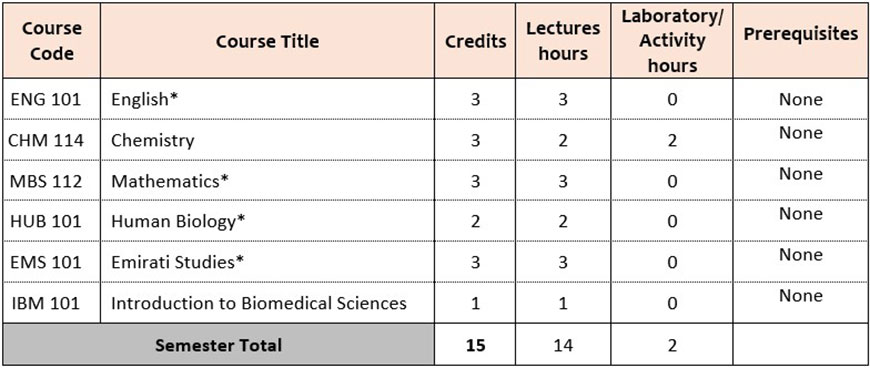
*General Education courses
Semester – 2
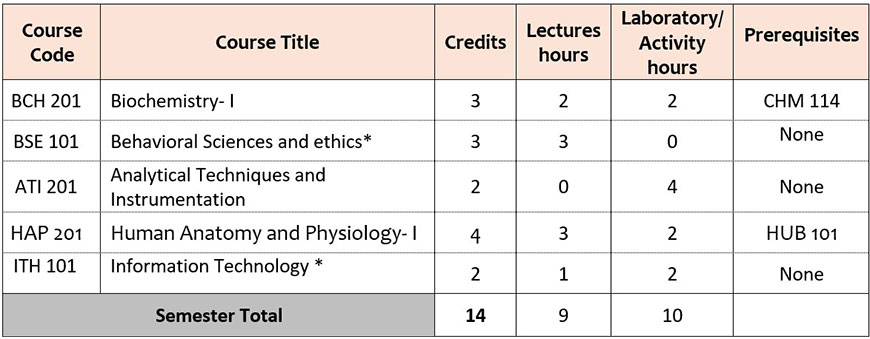
Semester – 3
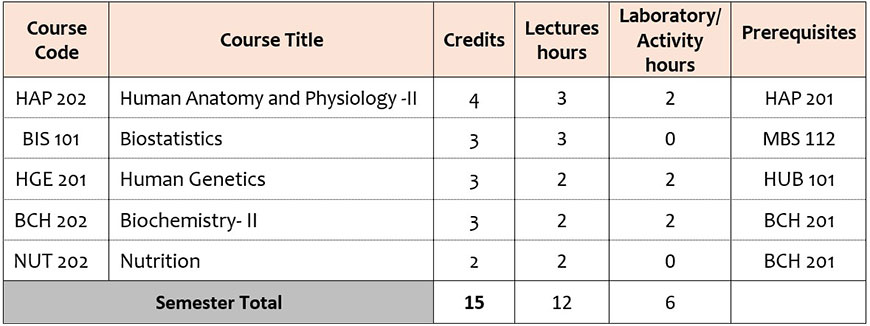
Semester – 4

Semester – 5
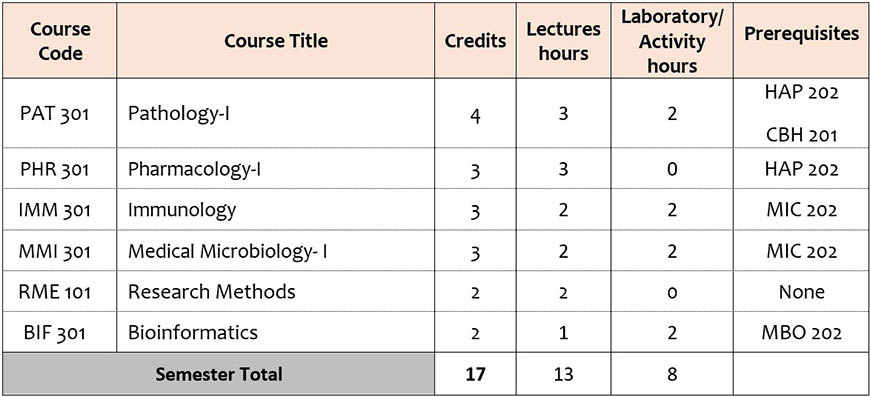
Semester – 6

**Pre-requisites ENO 302 -Nil, Neuroscience- HAP 202, Cancer Biology – CBH 201, MBO 202
Semester – 7
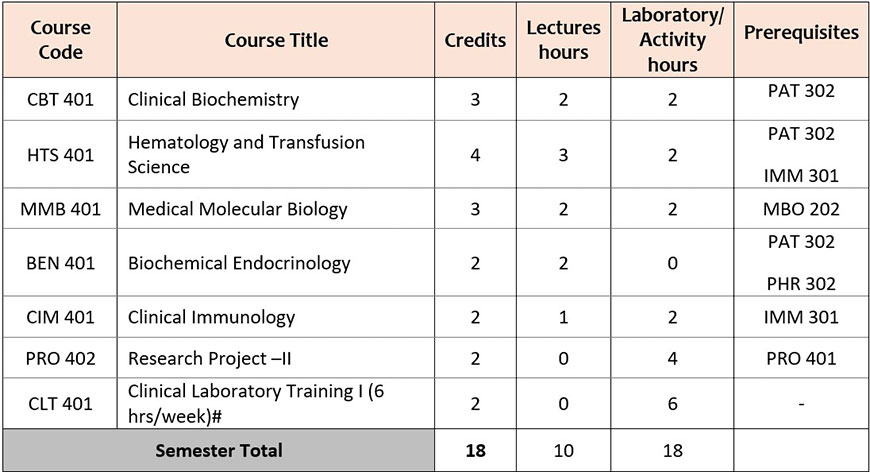
#Can also be done in summer/winter breaks as an elective
Semester – 8
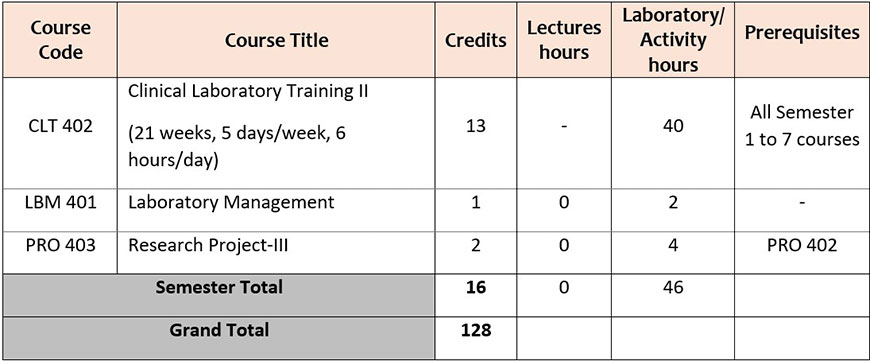
Course Descriptions
Brief course descriptions for all courses of the BBMS program including the general education courses are listed below.
A. GENERAL EDUCATION COURSES
General Education courses have been standardized and aligned across all programs at Gulf Medical University. They are designed to meet the Standards 2019 of the Ministry of Education, Higher Education Affairs, United Arab Emirates. The course descriptions for the General Education courses in the BBMS program are given below:
ENG 101: English Language
The course provides an intensive instruction in the communication process in English focusing on the organization of ideas in well-developed expository and argumentative essays with emphasis on developing vocabulary and writing. In the process the students will be able to document their learning experiences effectively. This course prepares students to be proficient in spoken and written English. It is intended to improve the use of the English language as a basic tool for professional communications.
MBS 112: Mathematics
This course provides concepts of mathematics including concepts of calculus needed for students of biological sciences. The course will emphasize on contents relevant to analyzing biological systems; application to biological systems will be illustrated. The objective of this course is to prepare the student to apply principles of mathematics including functions and their limits, derivatives of functions, integrals and solve first order linear equations to understand biological systems.
USO 101: UAE Society and Cultural Diversity
This course focuses on the unique nature of the UAE society and its political, geographical, cultural, demographical, and social aspects. It highlights the Emirati perspective of contemporary global changes. This course allows the students to explore the Emirati society in global context. The students will get an insight into the unique political, geographical, cultural, demographical, and social aspects of the UAE society. They will use this knowledge in their interpersonal dealings with individual members of this community. Students will develop awareness of cultural diversity advantages and disadvantages and discuss cultural, social and communication sensitivities and will be able to relate themselves to global context.
BSE 101: Behavioral Sciences and Ethics
The course is designed to give an overview of the main topics in behavioral sciences and Ethics including biological basis of behavior, mental processes, sensation and perception, learning, motivation, intelligence, human development, personality and universal ethical principles. The objective of the course is to enable the student to understand and apply the knowledge, skills and attitude developed in this course to communicate effectively. Students will learn and practice strong values, ethical conduct and social responsibilities, especially personal, academic and professional integrity while developing collaboration in diverse team settings. Students will be trained to display sensitivity to cultural, psychosocial and ethical issues.
ICU 101: Islamic Culture
The course aims to introduce the learner to the concepts and beliefs in Islam that form the basics of Islamic culture. The students are expected to identify the differences, compare values and preferences in Islamic culture with the existing ones. The course consists of a general review of Islam as a religion and as an approach to life. The objective of this course is to enable the student to demonstrate awareness of the effects of culture upon interpersonal communications and to interact appropriately to the culture of the colleague/patient.
ITH 101: Information Technology for Healthcare Professionals
This course provides the essential principles and Knowledge on technology sciences for Healthcare Professionals necessary for their day-to-day practice in the world of digital health. In addition, the course will provide concepts that connect applications in developing practical skills for accessing and using the information to deliver quality patient care, use education technology and develop electronic communication skills.
BIS 101: Biostatistics
This course presents biostatistics related to health and medical problem solving in an analytical way. It introduces the student to the principles of statistics and concept of clinical trial design and analysis. Student will be able to explain the concept of variables, data description; probability and concepts of descriptive and inferential statistics; and to demonstrate basic knowledge of application data analyses in applied health sciences. Student will be able to make decision about appropriate use of descriptive and inferential statistics according to the type of data and study design for answering a particular research question. This is a foundation course and prerequisite for the research courses which will be taken later.
EIS 101 Entrepreneurship, Innovation and Sustainability
This course aims to initiate students in innovation process, enable them with basic entrepreneurship skills and make them understand the concepts of sustainability in modern word in the field of their future profession. Course is designed in 3 parts in order to explain main principles of entrepreneurial process; to link them with concept of innovation and to engage in sustainability leadership to affect positive societal change. For future health professionals this course must ensure ability of medical decision making properly balanced between professional, ethical approaches on one side and finance and business on the other side.
B. CORE COURSES
CHM 114: Chemistry
This course provides in depth understanding of nature of matter, stoichiometry, basic chemical reactions, thermochemistry, organic compounds, atomic structure, the periodic table, and chemical bonding. Knowledge of Hydrogen ion concentration (pH), acids, bases and salts; chemical and biological buffers in relation to homeostasis is also provided. Students will consider how scientific knowledge is acquired, applied, and communicated, as they explore many of the key concepts central to the science of chemistry. By working through example cases and practice problems, students will further develop their chemical content knowledge, critical thinking abilities, and problem-solving skills. The course thus provides the student with the knowledge of Chemistry preparing him/her to comprehend higher level courses in the following semesters.
HUB 101: Human Biology
This course provides the relevant foundation for students of biomedical science. It introduces students to the structure and functioning of the major human body systems including the gastrointestinal, cardiovascular, respiratory, urinary, neuromuscular and endocrine systems. Concepts of genes and heredity, infection and immunity as well as the relationship between man and environment are also covered. The objective of this course is to enable the student to apply knowledge of the structure and function of the organ-systems to the working of the human body. The student will apply knowledge of heredity and the roles of chromosomes and genes, concepts of infection and immunity to understand disease states.
IBM 101: Introduction to Biomedical Science
This course is a mix of interactive seminars, discussions, laboratory visits and group activities. The aim of the course is to orient students to the University, the BBMS program, roles of Biomedical Scientists and possible career pathways. Seminars by professionally qualified biomedical scientists will introduce students to ongoing research in biomedical science fields and the contribution of biomedical research to advancement of medical science. Seminars will serve to stimulate interest and spirit of critical inquiry in the students. Students will also be taken on visits to various laboratories to introduce them to future careers and workplaces.
BCH 201: Biochemistry-I
The aim of the Biochemistry-I course is to provide the student with an understanding of the basic structures of biomolecules and their roles in the cellular processes occurring in healthy humans. Comprehension of the structure-function relationships will enable the student to appreciate derangement of function resulting from abnormalities in structures of the biomolecules. Roles of enzymes and coenzymes and their mechanisms of action are also highlighted.
ATI 201: Analytical Techniques and Instrumentation
This course provides comprehensive knowledge of the principles and applications of common analytical techniques and laboratory instruments used in biomedical sciences. The course gives a basic understanding of various units of measurement, conversion and additional experimental quantities. The course focuses on laboratory calculations and procedures to prepare different types of solutions. It also explains the different ways of expressing the concentration of solutions, such as percent solution, normality and molarity. The course also focuses on working with standard laboratory instruments in the biomedical sciences. This course provides the student with a strong foundation for comprehending the basic biomedical science in the 4th to 8th semesters.
CBH 201: Cell Biology and Histology
This course will introduce students to the microscopic structure and function of the cell. It includes study of structure and functions of cell organelles, cell-cell interactions, membrane transport and cell signaling, phases of the cell cycle and regulation. Knowledge of the normal structure and functioning of the human body learnt in the Human Biology course will provide the necessary foundation for this course. Principles of the techniques used for studying cells and tissues will also be learnt along with opportunities to learn to identify and correlate the microscopic structure of various organs and tissues with the normal functions. This course will provide the basis to explain the pathophysiological aspects of altered health as explained in Pathology-I course.
HAP 201: Human Anatomy and Physiology-I
This course is designed to study the structure and function of the normal body and integrates all aspects of the individual cells and organs of human body. Knowledge of the normal structure and functioning of the human body learnt in the Human Biology course will provide the necessary foundation for this course. The contents of the course will focus on three areas based on disease-health continuum namely structure of human body, control of normal body functions and pathophysiology or alterations in body function. The objective of this course is to enable the student to explain the structure and function of systems of human body and their organ components of blood and immune system, musculoskeletal system, autonomic nervous system, alimentary system and integumentary system; apply the physiological principles to elucidate the pathogenesis of diseases and perform experiments to record physiological parameters and interpret the data. This course would provide the basis to explain the pathophysiological aspects of altered health as explained in Pathology-I and Pharmacology-I courses in semester 5.
HGE 201: Human Genetics
The aim of the Human Genetics course is to introduce the students to the basic principles of human genetics. It enables the student to understand the morphology and nomenclature of chromosomes and standard notations used in karyotyping, concepts related to chromosomal abnormalities including numerical and structural abnormalities and mosaicism, single-gene inheritance, complex inheritance, variations in expression of dominant and recessive phenotypes and population genetics including Hardy-Weinberg Equilibrium, founder populations and frequently occurring alleles. Pedigree charts and ethical issues in medical genetics will also be discussed. This course along with Human Anatomy and Physiology-I, Cell biology and Histology, Human Developmental Biology and Molecular Biology make a strong foundation for Medical Molecular Biology that is taught in year 4. Student seminars will make them aware of recent advances and ongoing research.
BCH 202: Biochemistry-II
This course focuses on the topics of bioenergetics, metabolism of carbohydrates, lipids, proteins. Knowledge of the normal structure-function relationships of the biomolecules as well as role of enzymes and minerals learnt in the Biochemistry-I (BCH 201) course provide the necessary foundation for this course. Regulation and inter-relationships of metabolic pathways in the body as well as their adaptation to fed and fasting states will be discussed. Derangements in metabolic pathways in common metabolic diseases will also be learnt. Quantitative analysis of glucose, proteins, lipids, urea and uric acid in blood and body fluids will be performed. The course will also enable the student to understand the role of energy and energy transfer mechanisms in cellular reactions and processes. Knowledge of this course will form a foundation to understand the Clinical Biochemistry (CBT 401) and Biochemical Endocrinology (BEN 401).
NUT 202: Nutrition
The Nutrition (NUT 202) course is designed to provide an understanding of the principles and concepts of nutrition. In this course, students will understand the importance of good nutrition in maintaining the normal functioning of the body as well as correlate poor nutrition to disease states including anemia, diabetes and cardiovascular disease. Global issues in nutrition including malnutrition, food safety and security as well as lifestyle disorders including obesity and eating disorders will also be discussed. Knowledge of the normal structure and functioning of the human body learnt in the Human Anatomy and Physiology courses as well as the structure-function relationships of the biomolecules learnt in the Biochemistry courses provide the necessary foundation for this course.
HAP 202: Human Anatomy and Physiology-II
This course is designed to study the structure and function of the normal body and integrates all aspects of the individual cells and organs of the human body. The contents of the course will focus on three areas based on disease-health continuum namely structure of human body, control of normal body functions and alterations in body function. The objective of this course is to enable the student to explain the structure and function of systems of human body and their organ components of cardiovascular system, respiratory system, endocrine system, nervous system, reproductive system and urinary system; apply the physiological principles to elucidate the pathogenesis of diseases and perform experiments to record physiological parameters and interpret the data. This course would provide the basis to explain the pathophysiological aspects of altered health as explained in the Pathology and Pharmacology courses in semester 5 and 6.
MBO 202: Molecular Biology
The Molecular Biology course will provide biomedical students with a good foundation in concepts of molecular biology including techniques and applications. The course starts by introducing students to the structure and function of nucleic acids, organization of the genome, processes of replication, concepts of repair, RNA and protein synthesis, moves on to mechanisms of gene expression and regulation and finally to the basics of DNA technology. Genetically modified organisms and genome analysis are also touched upon. The course emphasizes the process of discovery, recent advances in technology and ethical considerations in molecular biology research.
MIC 202: Microbiology
This course provides knowledge about the fundamental characteristics of microorganisms and their structure, nutrition, metabolism, growth etc. It deals with general mechanisms of pathogenesis of various microorganisms and the modes of transmission. It also provides knowledge about bacterial genetics. Practical sessions will cover sterilization, disinfection & infection control, gram and acid-fast staining, culture media & methods used in the identification of bacteria, viruses, fungi & parasites and also serological reactions. Students will be able to perform common laboratory procedures to identify these organisms. This course will help the student have a strong foundation regarding the basic principles of microbiology which in turn will help them to understand the concepts taught in the Medical Microbiology and Clinical Immunology courses in subsequent semesters.
HDB 201: Human Developmental Biology
The Human Developmental Biology course is organized in two parts. In the first half of the course, focus is on the important biological principles underlying developmental biology and approaches used to study development using model organisms. Students learn the principles and processes underlying the development of an embryo from a fertilized egg as well as the advantages and limitations of model organisms used to study development. The second half of the course focuses on organogenesis with special emphasis on the human; as well as current topics in the field of developmental biology including stem cell and regenerative biology along with their applications in biomedical research and therapy. The structure and function of the human body learnt in the Human Biology course will provide the necessary foundation for this course. Concepts learnt in the Human Genetics course will help students further understand the genetic approaches used to study embryogenesis and development.
EPI 302: Epidemiology
The course is an introduction to the science of epidemiology. In this course students learn epidemiology in the context of human health and disease. Epidemiological studies describe the natural history of disease and identify the determinants of disease to develop interventions to modify determinants or the natural history and thus provide the basis for development and evaluation of health policies and programs. Skills include calculation of key epidemiologic measures, evaluation of the strengths and weaknesses of different epidemiological methods and investigation techniques.
PAT 301: Pathology-I
This course is designed to provide an understanding of the different methods used in pathological examination and alterations of cell structure & function produced by different diseases. In this course the student will understand concepts of general pathology including cell injuries, etiology of diseases & their pathogenesis, and the different features of diseases. The course covers characteristics of cell injury, inflammation, tissue repair, hemodynamic dysfunction, neoplasia, nutritional diseases and pathology of infectious diseases. Practical sessions help the students understand morphological changes through specimens, models and slides. Preparation of cytology and histopathology slides by sectioning and staining will also be learnt. Knowledge of the normal structure and functioning of the human body learnt in the Human Anatomy and Physiology and the Cell Biology and Histology courses provide the necessary foundation for this course. This course is taught in the same semester as Medical Microbiology I where students learn the etiology, pathogenesis, diagnosis, prevention and treatment of various infectious diseases.
PHR 301: Pharmacology-I
This course covers the general principles of pharmacology with emphasis on the drugs acting on the autonomic and nervous systems. It also includes various changes that the drug undergoes after administration into the body and the factors that influence these processes. The site, mechanism of action and the multiple effects of various therapeutic agents through receptor and non-receptor mechanisms are also discussed. Knowledge of the normal structure and functioning of the human body learnt in the Human Anatomy and Physiology courses provide the necessary foundation for this course. This course also renders the knowledge required for understanding the actions of drugs acting on various body systems in the course Pharmacology-II (PHR 302).
IMM 301: Immunology
The course deals with the structure and functions of the immune system, mechanisms of innate, humoral and cell mediated immunity. This course will help the student to have a strong foundation regarding the basic principles involved in immunology which in turn will help them to understand the concepts involved in the clinical immunology course as well as Medical Microbiology courses in subsequent semesters. It also provides basic knowledge regarding autoimmunity & immunodeficiency disorders, hypersensitivity and transplantation.
MMI 301: Medical Microbiology -I
This course helps the students understand the etiology, pathogenesis, diagnosis, prevention and principles of treatment of various infectious diseases caused by bacteria and fungi. The student will learn methods used in the microbiology laboratory to identify pathogens in clinical specimens; important pre-analytical steps in microbiology laboratory testing, such as proper specimen collection, transportation, and processing of specimens. The objective of the course is to enable the students to demonstrate an understanding of the pathogenesis, clinical manifestations, laboratory diagnosis, treatment and prevention of infectious disease especially those caused by bacteria and fungi. This course will also include elements of safety and infection control which are very important for health professionals.
RME 101: Research Methods
This course helps the novice researcher to design a research protocol for a quantitative or a qualitative study. The steps from developing a research question to implementation will be discussed extensively with the help of examples. The objective of this course is to enable the student to integrate the principles of research methodology to design a valid and reliable research protocol for conducting research on questions raised in the practice of biomedical sciences from time to time.
BIF 201: Bioinformatics
The Bioinformatics course is multidisciplinary and builds on concepts of mathematics, computer science, biochemistry and molecular biology. Bioinformatics plays an important role in the fields of genome analysis, protein structure and function analysis, drug designing and evolutionary studies. The course will familiarize students with the basic tools and principles of Bioinformatics and their applications. A variety of software, available databases and computational tools used in Bioinformatics will be discussed. Concepts learnt in this course will be useful in the Medical Molecular Biology course in Semester-7.
MMI 302: Medical Microbiology -II
This course helps the students in understanding the etiology, pathogenesis, diagnosis, prevention and treatment of various infectious diseases. The student will acquire knowledge of major diseases caused by infectious agents (viruses and parasites) and methods used in the microbiology/virology laboratory to identify pathogens in clinical specimens; important pre-analytical steps in microbiology/virology laboratory testing, such as proper specimen collection, transportation, and processing of specimens. The objective of the course is to enable the students to demonstrate an understanding of the pathogenesis, clinical manifestations, laboratory diagnosis, treatment and prevention of infectious disease especially those caused by viruses and parasites. This course will also include elements of safety and infection control which are very important for health professionals.
PAT 302: Pathology-II
This course describes the pathophysiological processes underlying common diseases of the organ systems of the human body. It describes the structural and functional alterations in selected diseases of the cardiovascular, respiratory, alimentary, renal, endocrine, reproductive, nervous, musculoskeletal, integumentary and hemopoietic systems. The course will enable the student to explain the role of laboratory in the diagnosis of systemic diseases. The knowledge of the normal structure and functioning of the human body, the structure – function relationships of biomolecules and the alteration of cell structure and function in diseases learnt in the previous courses will be applied to understand the pathophysiology of the organ systems in the diseased state being taught in this course.
PHR 302: Pharmacology -II
This course provides both knowledge and conceptual understanding of the pharmacokinetic and pharmacodynamic properties of various classes of drugs affecting the cardiovascular system, renal system, hematopoietic system, respiratory system, gastrointestinal system, infections and cancers. Knowledge of general principles of pharmacology learnt in the prerequisite course entitled “Pharmacology-I” will provide the necessary foundation for this course. This course also includes the areas of current research in drug therapies for diseases such as lifestyle disorders (diabetes, hypertension, and cardiovascular events), cancers and infections.
FRM 302: Forensic Medicine and Toxicology
In the forensic medicine and toxicology course, students will learn the application of medical and paramedical sciences to study changes in death, mechanical & traumatic injuries, mechanical asphyxias, sexual jurisprudence, infanticide, biological fluids, and the role of autopsy procedures. It emphasizes the role of toxicological and molecular biological investigations in biomedical science and enables the student to be well informed about medico- legal issues and introduces the students to the ways in which medical science can assist in the resolution of legal issues in civil and criminal courts.
NSC 202: Neuroscience (Elective)
The course is designed to provide an integrated approach to learning how the brain and nervous system work to generate behavior, perception, movement, thought, memory and other key functions. This course also provides basic understanding about experimental techniques employed in neuroscience. Newer concepts and findings underlying pathophysiology of neurodegenerative diseases like Alzheimer’s and Parkinson’s disease will also be learnt in this course.
CBO 302: Cancer Biology (Elective)
The primary objective of the cancer biology course to help students acquire general knowledge about the hallmarks of cancer, types of gene mutations, how these mutations can contribute to cancer formation, role of oncogenes and tumor suppressor genes, cell cycle regulatory mechanisms and dysfunction, apoptosis and metastasis. This course will emphasize on the basic principles in cancer biology and focus on factors that contribute to cancer development and discuss latest evidence regarding cancer prevention. It will also provide an understanding of currently available diagnostic techniques and newer approaches to therapeutic treatments.
POH 302: Population Health (Elective)
The course focuses on factors that determine health, with special emphasis on social determinant of health and factors and issues of health equity. The course includes approaches to determine health needs of the population and how health can be addressed from within the healthcare system by ensuring partnership of healthcare system, public health agencies and nongovernmental organizations. The course will show how to involve evidence-based health practices in setting priority and how to retrieve, manage and share information with various stakeholders.
PRO 401: Research Project –I (Proposal)
This course is the first step in the process of conducting research. In this course the student will develop key skills of literature search, critical appraisal of literature, ethics, research design and scientific communication required for preparing a research proposal.
The students apply the principles learnt in the research methodology course to identify a research problem for their research project, prepare a research proposal according to the guidelines in the thesis manual and submit it for approval by the end of the semester. Selection of the research project topic will depend on interest of the student and must be approved by the academic advisory committee. A faculty member will agree to supervise the research project. The research project proposal will be the basis for the research work to be conducted in the 7th semester followed by submission of the research project report by the end of the 8th semester.
JCB 401: Journal Club
In this course, students meet weekly to discuss recent published scientific articles within the broad field of Biomedical Sciences. The main objectives of the course are to develop critical appraisal skills, to increase exposure to recent developments in biomedical sciences, and to promote gain in knowledge through discussion with experts and peers. The course also provides opportunities to promote interest in research and encourage interaction between students and faculty members. Each student will be assigned a faculty mentor who will help the student choose an appropriate article for presentation and for guidance during preparation of the presentation.
CBT 401: Clinical Biochemistry
In the clinical biochemistry course, students build on the knowledge gained in the biochemistry and the pathology courses and learn to apply the knowledge to the diagnosis of diseases including endocrine disorders. Students will study the basis of the tests performed in the clinical biochemistry laboratory for the diagnosis of diseases and learn to correlate the findings to disease states. Role of the laboratory in monitoring therapeutic drugs as well as testing for drugs of abuse will also be learnt. By the end of the course, students will be able to perform independently basic tests in the clinical chemistry laboratory and interpret the findings. Importance of laboratory safety, standards and quality control in the clinical biochemistry laboratory will be emphasized. Student seminars will make students aware of recent advances and ongoing research in the field of Clinical Biochemistry.
HTS 401: Hematology and Transfusion Science
The course includes the study of development, normal structure and functions of the cellular elements of the blood and their common disorders. The course emphasizes the causes, mechanisms including molecular basis of altered structure and function, laboratory and clinical features of these disorders. Additionally, hemostasis and related disorders of bleeding and thrombosis, and the principles and use of blood products in treatment are discussed. The objectives of the course are to enable the student to further develop knowledge of hemopoiesis, and to acquire knowledge and understanding of common diseases of the blood, bone marrow and lymphoid organs. Etiology, mechanisms, structure-function alterations underlying laboratory findings and clinical features of hematological disorders are emphasized. Principles of blood transfusion and its complications will also be studied. Laboratory sessions will help the students develop skills in performing hematology tests as well as interpreting the findings in case scenarios. This course will also emphasize the ever-growing prospects of translational research in hematology.
MMB 401: Medical Molecular Biology
This course is designed to provide students with knowledge and skills in molecular biology and integrate the understanding of the concepts and techniques of molecular biology to the diagnosis and treatment of human diseases. It will build on concepts learnt in the Molecular Biology course. Laboratory sessions will train the students in basic molecular biology techniques as well as the application of PCR based tests for diagnosis.
BEN 401: Biochemical Endocrinology
In the Biochemical Endocrinology course, students will learn to integrate the knowledge gained in the Human Anatomy and Physiology, Biochemistry- I and the Pathology- II courses and apply it to understand the basis of the tests performed for the diagnosis of endocrine disorders. Students learn to correlate changes in hormones and other biochemical parameters to normal and disease states in case scenarios. The course will highlight the role of laboratory in diagnosis and management of endocrine disorders. Student seminars will make students aware of recent advances and ongoing research in the field of endocrinology.
CIM 401: Clinical Immunology
The course deals with the study of immune-pathological conditions and abnormal immune functions and describes the principles of immunological techniques used in the diagnosis and management of various immunological disorders. The course provides a greater understanding of the role of immune system in susceptibility to diseases and measures taken for their detection and prevention.
PRO 402: Research Project-II
This course is designed to provide the student an opportunity to gain practical experience in the implementation of research based on the research proposal prepared in the previous semester. In this course, the student conducts research under the supervision of the faculty supervisor according to the research proposal submitted in the Research Project I course following the required guidelines after the approval of the Research and Ethics committee. The student will perform hands-on biomedical research in the laboratory and apply key skills of literature search, critical appraisal of literature, ethics, research design, statistical analysis and scientific communication. The student is required to present the research work to the academic advisory committee. The data collected will be analyzed by the student and used to prepare the project report in the next semester.
CLT 401: Clinical Laboratory Training I
Clinical laboratory training is organized into two parts CLT 401 and CLT 402. In CLT 401 the student undergoes clinical laboratory training in the seventh semester. The student gains on-the-job experience under the close supervision of his/her supervisors. It serves to provide opportunities to attain appropriate higher skill levels as the student has completed much of the didactic requirements of the program and is now given opportunities to improve his/her skills and master them before he/she enters independent practice as a technologist. The clinical laboratory training experience also gives an insight into the practice of the chosen profession and is in itself a strong motivating factor for the learner to continue and pursue higher education and specialize further in the chosen field of study.
CLT 402: Clinical Laboratory Training II
In this course Clinical laboratory Training II, the student undergoes clinical laboratory training in the final semester. The student gains on-the-job experience under the close supervision of his/her supervisors. It serves to provide opportunities to attain appropriate higher skill levels as the student has completed much of the didactic requirements of the program and is now given opportunities to improve his/her skills and master them before he/she enters independent practice as a technologist. The clinical laboratory training experience also gives an insight into the practice of the chosen profession and is in itself a strong motivating factor for the learner to continue and pursue higher education and specialize further in the chosen field of study.
LBM 401: Laboratory Management
The course is designed to provide the student with knowledge about the organizational structure of clinical laboratories, rules and regulations governing these laboratories and the use of basic managerial tools in their operation. The course covers aspects of quality assurance in the laboratory, management of technical and financial resources of a laboratory and outlines the steps for performance improvement.
PRO 403: Research Project-III
This course is the final step in the process of conducting research. In this course, the student analyzes the results obtained, presents the research work done before the academic advisory committee, faculty members and peers for approval. After approval the student is expected to prepare the research project report according to the guidelines of the thesis manual and submit by the end of the 8th semester to the program office.

















